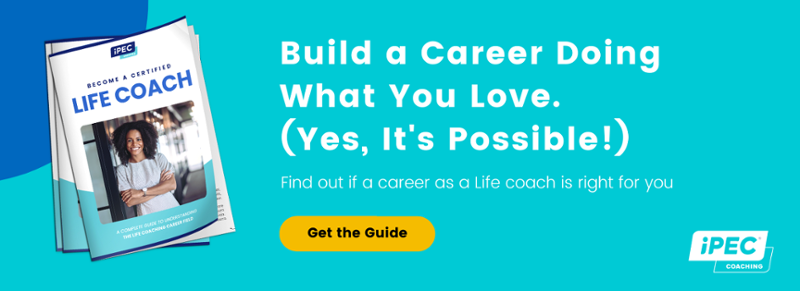What is Coaching, and What Makes it Such a Transformational Modality?
by Simone Noordegraaf, CPC, ELI-MP | iPEC Chief Business Development Officer
Nov 21, 2019 | 6 minutes read
Ask a hundred different coaches to explain, “What is coaching?”, and you just might get a hundred different answers.
Of course, you can find a literal definition in a dictionary, or you can check out the official industry explanation from the International Coaching Federation. Still, these descriptions may not necessarily bring the concept of coaching to life for you in a tangible way.
At its core, coaching is about helping people make profound and lasting shifts in their lives.
But what does it really mean? To get to this answer, let’s start with a simple conversation about perception.
Because reality is perception.
Think of this way: Reality is an empty coloring book, and we color in the pages with our individual biases, personal journeys, and fears. In doing so, we actually create our own reality and accept it as truth.
And this usually works fine—until we’re met with major challenges to overcome, out-of-the-box dreams to achieve, or a desire to break out of our daily “routine.” These are the times when our personally curated versions of reality can get in the way of living life to the fullest.
Once you become aware of the fact that you’re constantly shaping your own reality, you finally have the power to change it. By accepting that you’re in control, you open yourself up to the possibility of a different, more fulfilling reality.
Here’s an example:
Heather was in the process of buying a house. For over a year, she’d gone back and forth on this huge decision. The logical side of her brain kept saying, “You pay rent every single month to someone else so he can pay his mortgage, so why don’t you just pay your own mortgage instead?” And while that reasoning made all the sense in the world to Heather, she still couldn’t move forward.
She spent many sleepless nights imagining that something catastrophic (like losing her job) might happen and affect her ability to afford the mortgage. In essence, Heather was subconsciously creating her own set of “fake” problems to validate her decision to stay in her comfort zone and continue renting.
Unless Heather developed an awareness of this perceived reality, she couldn’t gain the power and control to change it. She couldn’t cultivate the renewed perception she needed to rise above those fears and make an empowered decision (like buying a house) to change her life for the better.
And THAT is precisely where coaching enters the picture.
The practice of coaching helps people become more in control of their thoughts and behaviors, so they can overcome self-imposed limits and clearly see the options available to reach for more in their lives.
Become a Certified Coach to Create Transformations
Coaching is sometimes described as the practice of helping individuals achieve their goals. But there’s a critical distinction to make between the traditional model of coaching and a more transformational approach which sustains long-term change. Because masterful coaches provide much more than simple accountability and encouragement.
In its simplest form, traditional coaching is about helping another person strive toward their stated objectives.
This is accomplished by helping them follow through on tasks and respond to challenges. “Looking to get to the next level in your career? Here’s a step-by-step action plan to make that happen, and here’s how I’ll be holding you accountable to making those strides.”
However, this traditional approach has its limitations and weaknesses:
- Some people have all the enthusiasm and effort they require, yet they still can’t figure out why they repeatedly get stuck.
- Others have grown accustomed to feeling successful just by lowering their expectations—or worse, setting no goals at all.
- Some limit what they say they can or want to accomplish. They do this in the interest of being “realistic” or “practical,” when in reality, they may have no idea what they are capable of or they’re simply afraid of disappointment.
This is why traditional coaching often results in short-term benefits. It doesn't seek to identify the hidden blocks that cause people to fall short of their goals or desires. It doesn't get to the root cause behind self-limitations.
Without recognizing and resolving those inner roadblocks, the client often falls back into the same patterns of behavior, repeating old habits, routines, and actions over and over again and experiencing the same disappointing or frustrating outcomes.
And that’s why transformational coaching is far more effective.
It’s about guiding someone to explore the “story” they’ve told themselves for so long. A transformational coach not only helps people go from where they are now to where they want to be, but also empowers people to become the leaders of their own lives.
And this transformative process doesn’t always necessarily have to unfold in a conventional coach-client relationship. Coaching has the capacity to help someone unite a team of employees, lead more successful interdepartmental projects, or improve one-on-one relationships.
Even a small shift in any given moment can have a huge impact. If just one person shifts from a place of frustration to one of opportunity, it can change the entire dynamic of a workplace or family. For instance, one simple choice to be compassionately curious with your partner instead of getting angry or annoyed can change your entire connection. It only takes one second, but it can have a lifetime effect.
Transformational coaching leverages various tools and methodologies for building this kind of internal awareness so that people can:
- Identify long-held perceptions and beliefs that hold them back
- Consciously redesign those beliefs to fuel them toward achieving greater potential
- Recognize when they’re reacting to life’s circumstances instead of choosing how they want to act
- See opportunities when others see problems
- Cultivate a new perspective for rewriting the rules of their own life
One of the most fundamental aspects of life is connecting with others, but it’s not until we learn to understand and change ourselves that we can significantly improve our relationships and accelerate the joy in our lives.
In a big way, that’s what transformational coaching does for people.
Generally speaking, how we “do” one thing in our lives is how we do everything in our lives. So when we learn to change one component (a job, a marriage, etc.) for the better, we can start to change them all.
The Importance of Energy in Coaching
Around the iPEC coach community, the idea of “energy” is a fundamental one. Perhaps you’ve heard the term before and wondered if it was just another overused piece of jargon. Let’s break it down in clearer language so you can make a more tangible connection to its coaching application.
As iPEC founder Bruce D Schneider has laid out, people are continually experiencing energy in one of two ways: catabolic or anabolic. Neither type of energy is necessarily “right” or “wrong,” as they can both be valuable and useful for different reasons.
- Anabolic energy is constructive, expanding, fueling, and creative.
- Catabolic energy is destructive, draining, or resisting.
The type of energy we experience fluctuates throughout the day and from situation to situation. But because of the way we each interpret our life experiences (think back to the coloring book example!) we often wind up experiencing the same type of energy over and over again. As a result, many people get stuck in draining, catabolic energy.
iPEC coaches have the skills and the know-how to help these people raise their energy levels to an anabolic state and become more aware of their actions and choices. Someone who is coached in this way is more apt to inspire others, becomes more open to innovation and possibility, and is far better able to pursue goals and find fulfillment in their lives.
The shift toward anabolic energy allows people to access creativity and intuition more quickly, rather than resorting to frustration, resentment, and other low-level responses, which can feel limiting and exhausting.
It’s not just about positive thinking, though. It’s much deeper than that.
By developing an awareness of how you approach both your individual circumstances and life as a whole (i.e., what ENERGY you bring to the table), you become more aware that you have a choice. You’re able to realize your energy and shift it more quickly to a more effective level.
Whatever blocks or diminishes a person’s available energy will either slow down or derail their progress toward their goals. While working with a transformational coach, people often become aware of their false perceptions and limiting beliefs about what’s possible as they learn new ways to work through blocks and obstacles.
By reducing destructive, draining catabolic effects on energy and focusing on developing more expansive, creative, synergistic anabolic energy, a person will find it easier to work toward and attract the kinds of experiences and opportunities in life that lead to a greater sense of flow and personal satisfaction.
Ultimately, coaching helps you become aware of your energy levels so that you can choose how to use them. It also gives you the tools you need to free up blocked energy within yourself. You learn to leverage this newfound energy to access a higher level of consciousness and finally see possibilities that you simply couldn’t before.
It’s about living life on purpose, not just as a product of circumstance.
That’s why we say that coaching is not giving advice or telling people what to do. It’s uncovering the power within them to notice the world like they never have before and live the life they’ve always wanted to live.
What Does Coaching Mean to You?
If you’ve been reading this explanation of what coaching is and wondering if this industry can change your life, there’s plenty more information to sink your teeth into.
Individuals who are drawn to the coaching field have a passion for people, an innate desire to see others achieve results, and a drive to help, motivate, and inspire. In this field of work, you have the potential to experience a deep sense of satisfaction by making a positive difference in people’s lives.
Curious about becoming a professional coach?
Check out our in-depth guide to the field of coaching, and find out whether it might be the right career path for you!


